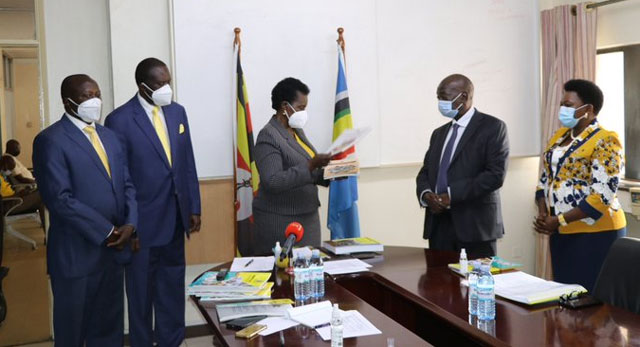
Kampala, Uganda | THE INDEPENDENT | Former Trade Minister Amelia Kyambadde has said there is no reason for one to show bitterness when they are dropped from a political appointment. Kyambadde says 40 years of serving the nation was more than enough and she is not complaining.
Kyambadde’s first job in government was in 1979, serving as personal secretary to the Minister for Defense, as a 24-year old. She has since served through various positions before becoming a Member of Parliament for Mawokota North and later a Trade Minister, a portfolio she held for two terms.
Kyambadde says that her main challenge in the sector has been the limited funding despite the importance of the sector to the economy. She says that the ministry is not recognized, yet it is the end of all the value addition on all other sector like agriculture and mining, among others.
“When I took over 10-years ago, the ministry was in a mess. And the first comment that people made was why the president had decided to take me to such a ministry,” she says adding that business associations like Kampala City Traders Associations were intimidating everyone.
She has challenged the new leadership at the ministry, which also includes the retained Minister of State for Cooperatives, Frederick Ngobi Gume, to press the government to stay up-to-date with paying subscription fees to the international membership organisations so as to maintain the market. This, she says is important to maintain Uganda’s regional and international markets.
However, the ministry has been unable to effectively fulfil its goals, mainly because it was underfunded, and was always a victim of government budgetary cuts and reallocations according to Kyambadde.
On his part, Gume renewed calls on government to find a way of re-establishing a cooperative bank if the cooperative movement is to be strengthened achieve its objectives. The Uganda Cooperative Bank, which had been started in 1964 as a credit institution, was dissolved in 1999 over low capitalization and mismanagement.
As the government embarked on reviving the cooperative sector, the idea was mooted to establish a new bank. Parliament passed the Cooperative Societies Amendment Act 2019, stating in Section 19 that that; “There shall be a cooperative bank to serve the interests of the cooperative societies and individual members. The bank shall be regulated by the Bank of Uganda.”
On his part, new State Minister for Industry David Bahati, who has been State Minister for Finance, Planning and Economic Development, admits that sometimes, some ministries or sectors have to lose priority when there is need to mobilise more resources for other sectors. While receiving his new ministry on Friday, Bahati said that his view of the Ministry of Trade had changed and now thinks that actually, it is the heart of the economy, not the Finance Ministry.
The New Minister of Trade, Industry and Cooperatives Francis Mwebesa pledges to tackle the problems at the ministry and especially make the local entrepreneurs the lead investors in the country.
He blamed the business community for always running to the president each time they have a challenge, however small.
Mwebesa, and industrialist and investor in the minerals sector, says the behavior of the local business community makes the president appear to have control over all businesses. But he says they will try to reach out to the private sector.
*****
URN
 The Independent Uganda: You get the Truth we Pay the Price
The Independent Uganda: You get the Truth we Pay the Price






“The New Minister of Trade, Industry and Cooperatives Francis Mwebesa, blamed the business community for always running to the president each time they have a challenge, however small.”
Don’t blame the business community for approaching the President, he’s the one who encourages this practice because he wants to be seen as the solver of every problem in the country.
For whatever issue misses the president’s intervention, it’s never worked on. The idea to approach the president other than the ministers is vital if at all one must get to be worked on. Therefore, the minister shouldn’t be complaining since it is way to go. No president intervention nothing done.